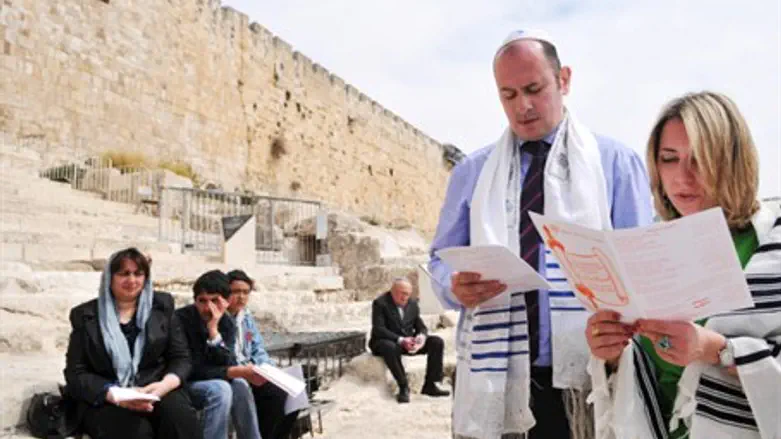
Reform Judaism's Policy Action Center in Washington is a bastion of liberalism. Nearly all its policy initiatives revolve around objectives of the Democratic Party, including some rebuke for Binyamin Netanyahu's speech several weeks ago.
The perception that all Reform Jews are of that mindset however would be misguided. Gerry Cantor, a board member for Hillel at Rutgers University and a major supporter of Keren Ness which sponsors Zionist projects in the Negev, does not fit that mold.
"I am more of a classical Zionist. I think nearly all Reform Jews march lockstep into liberal politics."
Cantor is a member of three Reform synagogues, yet he is an ardent conservative. That is especially true on issues regarding Israel, which he says led him to change his 2008 vote for Barack Obama to one for Mitt Romney in 2012.
Cantor's divide with much of his movement might be explained by a generation gap. Older Jewish Americans are much more inclined to identify with the country than their modern-day, sometimes lesser-affiliated grandchildren.
Cantor describes connections with Rabbi Eric Yoffie, the former head of Reform Judaism, and Rabbi Richard Hersh, a long-time activist in the movement. He still perceives that the movement, in conjunction with its lobbying army, has shifted to more left-wing positions in order to be relevant on Capitol Hill.
"You can't say 'I'd like to leave things the way they are,'" says Cantor, stressing that any political movement needs to show grit in order to remain relevant. "In order to have some political clout, you need to take a more extremist position."
Mr. Cantor has been active in the community in major ways for at least 30 years, going back to the days when Jews worldwide lent hands to battered Jews of the Soviet Union.
"I've been to Leningrad, but I've never been to St. Petersburg," he says in reference to his past work for the community, using the Soviet-era and Russian Federation-era names for the city. His major cause today is Keren Ness (Ness Fund), specifically devoted to the needs of the Negev. On a recent trip, Cantor toured the south in cities like Yerucham, Beer Sheva, Arad and Dimona.
The Ness Fund invests in the development of the south, including but not limited to supporting poor families, helping with Bedouin integration into Israel, and developing the business sector.
One project that he is particularly proud of is Halutzah, a small cooperative of about 30 families who were removed from Gaza during the Disengagement.
On the Obama-Netanyahu spat, he senses that most of his Reform peers are out of step with reality on what the US is doing to its relationship with Israel.
"I said, "Wait a second. There's a visceral hatred here.' Forget about what Bibi thinks, Obama hates him."
"You don’t say (those things) unless you really feel it in your kishkes."
Cantor describes discussions on politics for him tend to revolve around a much more Democratic-leaning circle of friends, but that he has insisted on communicating to his peers that Barack Obama at the very least has no interest in maintaining a special relationship with Israel.
On the other hand, Netanyahu seems to be much stronger and much more appropriate for the country given the context he feels Israel continues to live with today - one of existential danger.
"He understands very well what the State of Israel is. When I was bar-mitzvahed there was no State of Israel. So unlike most Jews in the US, I still see how these problems are an existential threat."
"Anyone less than 100% for Israel and its continuance is not my friend. I don’t care if you phrase it in terms of equality and inequality or in terms of something else. Israel is the same as any other country."
He envisions though that going forward, there will be continued disconnect between Reform leadership’s continuous critiques of Israel and how that criticism might be amplifying an already disconnected generation from incorporating Israel into their identities as Jews.
“Reaching the younger crowd is massively hard. They are very disconnected. That will be the challenge going forward – connecting them to Israel.”